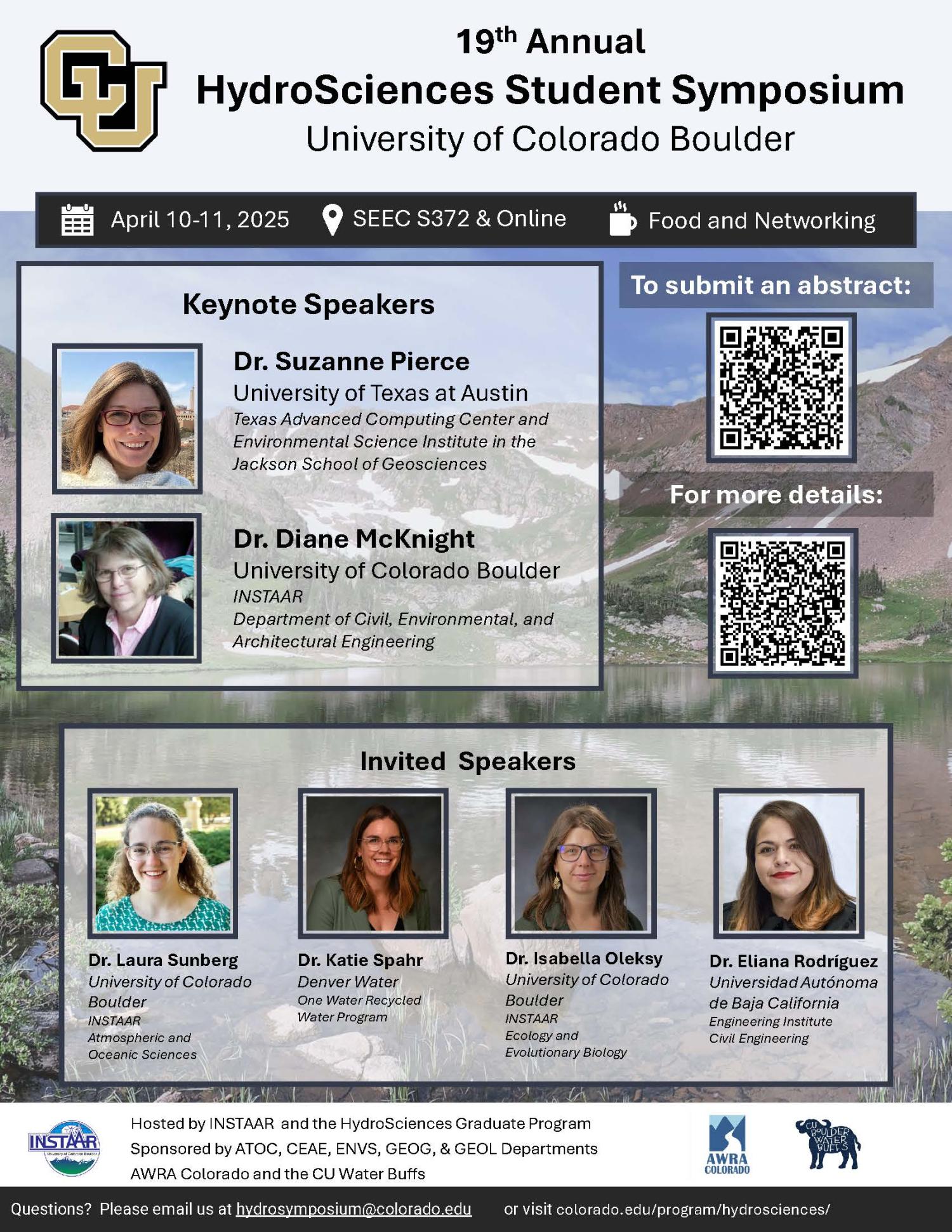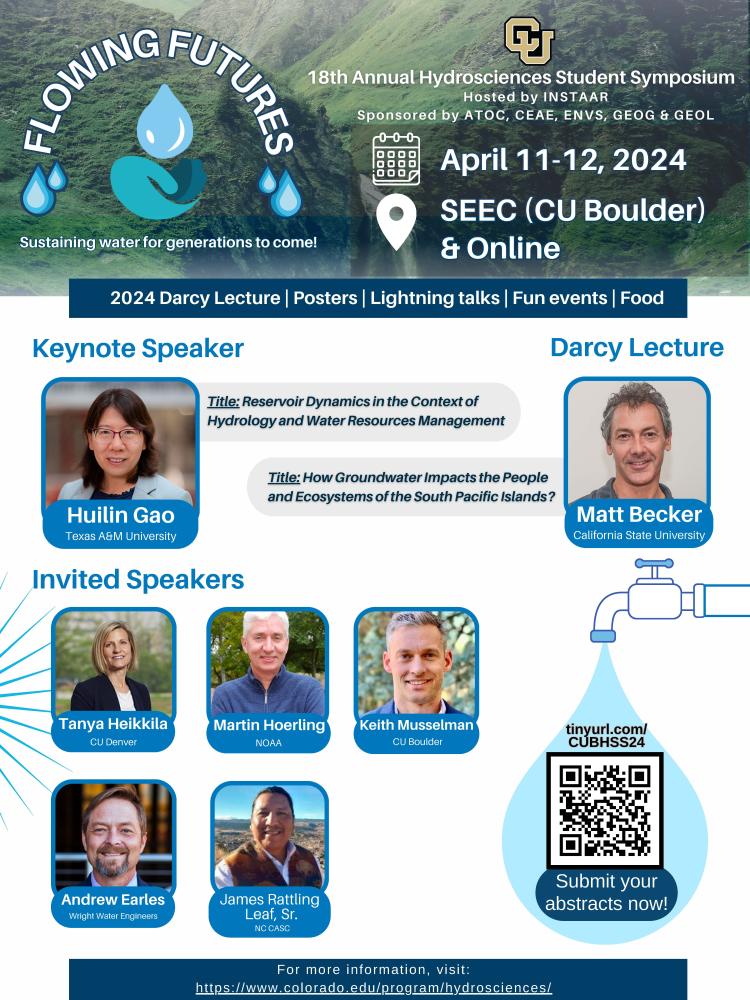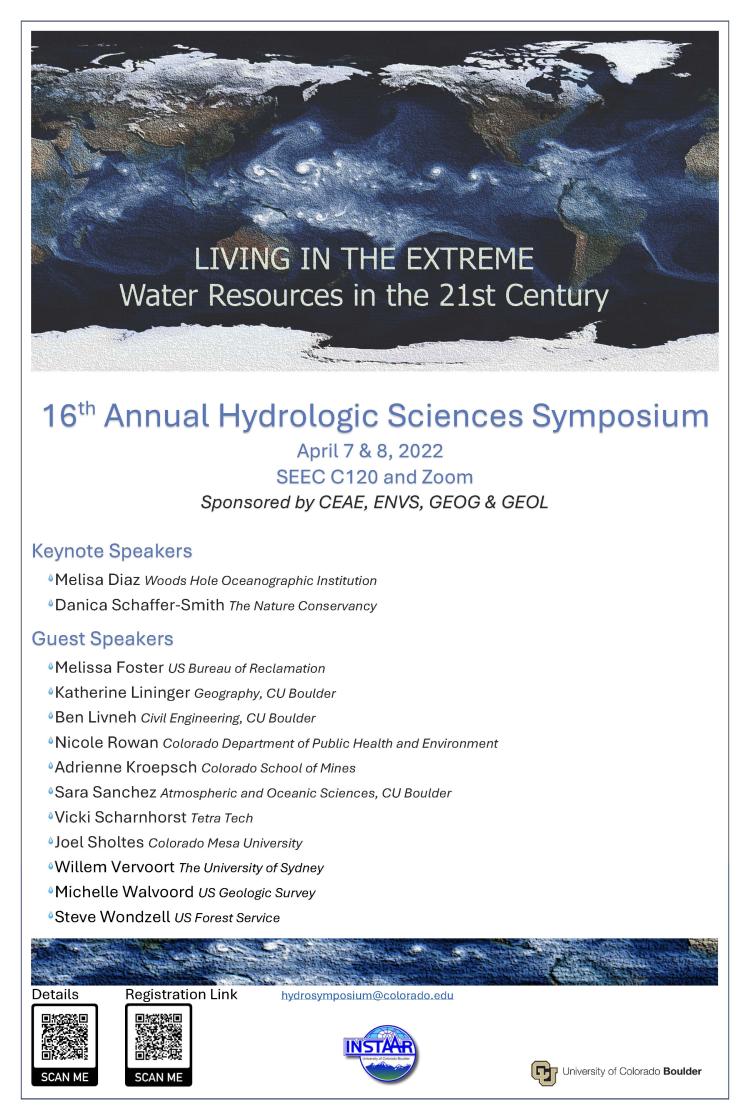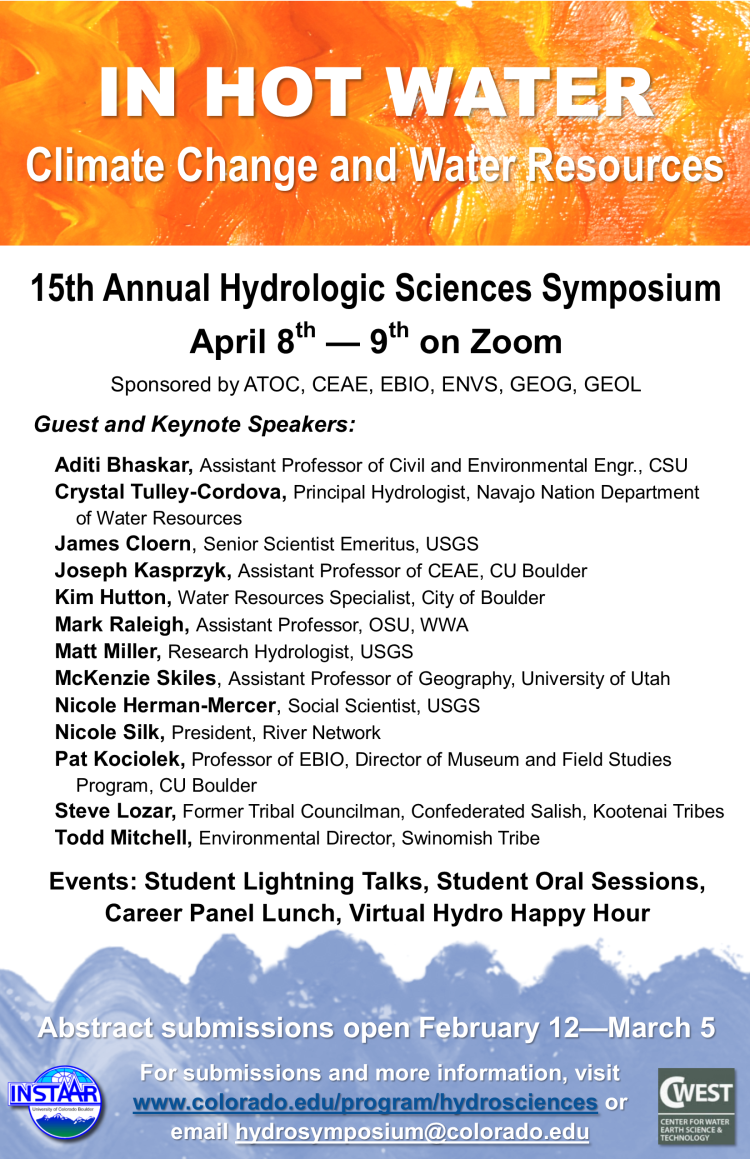Past Symposia
The annual Sciences Student Research Symposium began in 2006.
2025
The 19th Annual Hydrologic Sciences Student Symposium
2025 Featured Speakers
Professor of Civil, Environmental, and Architectural Engineering
KEYNOTE • Research Scientist • Texas Advanced Computing Center and Environmental Science Institute in the Jackson School of Geosciences • University of Texas - AustinDr.
2025 Invited Speakers
Assistant Professor Ecology and Evolutionary Biology
Professor of Engineering • Universidad Autonoma del Estado de Baja California • Engineering Institute
Denver Water • One Water | Recycled Water Program • Water Resources Planning • Water Resource Engineer
Postdoctoral Scholar • INSTAAR Coastal Oceanography Modeling Group.
AWRA Colorado Career Panel
2025 Hydrologic Sciences Symposium Steering Committee
- Tina Geller PhD ATOC
- Nicholas Guthro PhD CEAE
- Jason HananiaMS CEAE
- Jo Martin PhD GEOL
- Christopher McNabb PhD GEOG
- Santiago Ramirez Nuñez PhD CEAE
2024
Flowing Futures: Sustaining Water for Generations to Come
The 18th Annual Hydrologic Sciences Student Symposium
Invited Speakers
Keynote Address
Huilin Gao, Professor, Zachry Department of Civil and Environmental Engineering, Texas A&M University
Darcy Lecture
Matt Becker, Conrey Chair in Hydrogeology and Professor of Earth Sciences, California State University, Long Beach
Guest Speakers
Tanya Heikkila, CU Denver
Martin Hoerling, NOAA
Keith Musselman, CU-Boulder
James Rattling Leaf, Sr., RL NC-CASC; CU-Boulder
Andrew Earles, Wright Water Engineers, Inc
Steering Committee
Tina Geller ATOC PhD
Nick Guthro CEAE PhD
Jo Martin GEOL PhD
Chris McNabb GEOG PhD
Parth Modi CEAE PhD
Santiago Ramirez Nuñez CEAE PhD
Prasad Thota CEAE PhD
Holly Barnard Hydrologic Sciences Program Co-director
Mike Gooseff Hydrologic Sciences Program Co-director
Sarah Rogers Hydrologic Sciences Program Coordinator
Hosted by
INSTAAR - Institute of Arctic and Alpine Research
Sponsors
ATOC - Atmospheric and Oceanic Sciences
CEAE - Civil, Environmental & Architectural Engineering
ENVS - Environmental Studies
GEOG - Geography
GEOL - Geological Sciences
2023
The 17th Annual Hydrologic Sciences Symposium
From Source to Sink: Reimagining the Applied Hydrologic Sciences
Keynote Address
- Thomas Adams Senior Hydrometeorological Advisor at the United States Agency for International Development
The evolution of Hydrologic Forecasting — serendipity from failure and when things don’t quite work out
Darcy Lecture
- Alicia Wilson Professor of Hydrogeology in the School of the Earth, Ocean, and Environment at the University of South Carolina
Please check your assumptions at the coastline: 15 years of wading through salt marshes
Guest Speakers
- Mazdak Arabi One Water Solutions Institute, Colorado State University
- Sharon Bywater-Reyes Department of Earth and Atmospheric Sciences, University of Northern Colorado
The Good, The Bad, The Ugly: Lessons Learned from Colorado River Restoration Projects
- Hillary Hamann and Meghan McCarroll, Department of Geography and the Environment, University of Denver
Impacts of innovative water security solutions on water literacy: A case-study from Aurora, Colorado
- Michael Kerwin Department of Geography and the Environment, University of Denver
Mega-drought Demands Mega-changes: Can the Western USA Learn from South Africa’s Response to the Day Zero Drought?
- Upmanu Lall Columbia University Water Center
The Co-evolution of Humans, Climate, Water, Earth and Biota: The Next Chapter?
- Dan Scott Watershed Science & Engineering
Understanding the Wood Regime to Support Stream Management
Student Symposium Steering Committee
- Abigail Eckland GEOL PhD 2024
- Taylor Johaneman GEOG PhD 2026
- Parth Modi CEAE PhD 2023
- Millie Spencer GEOG PhD 2026
- Prasad Thota CEAE PhD 2025
- David Woodson CEAE PhD 2023
- Anna Wright ENVS PhD 2025
- Holly Barnard Hydrologic Sciences Program Co-director
- Mike Gooseff Hydrologic Sciences Program Co-director
- Sarah Rogers Hydrologic Sciences Program Coordinator
Hosted by
- INSTAAR - Institute of Arctic and Alpine Research
Sponsors
- BOASE - Hydrologic Sciences and Water Resources Engineering Seminar Series
- CEAE - Civil, Environmental & Architectural Engineering
- ENVS - Environmental Studies
- GEOG - Geography
- GEOL - Geological Sciences
2022
The 16th Annual Symposium took place April 7-8, 2022 in SEEC and on Zoom.
Keynote Speakers
Melisa Diaz Woods Hole Oceanographic Institution
Danica Schaffer-Smith The Nature Conservancy and Arizona State University
Invited Speakers
Melissa Foster US Bureau of Reclamation
Adrienne Kroepsch Colorado School of Mines
Katherine Lininger Department of Geography, CU Boulder
Ben Livneh Department of Civil Engineering, CU Boulder
Nicole Rowan Colorado Department of Public Health and Environment
Sara Sanchez Department of Atmospheric and Oceanic Sciences, CU Boulder
Vicki Scharnhorst Tetra Tech
Joel Sholtes Colorado Mesa University
Willem Vervoort School of Life and Environmental Sciences, The University of Sydney
Michelle Walvoord US Geologic Survey
Steve Wondzell US Forest Service
Student Steering Committee
- Dylan Blaskey CVEN PhD 2024
- Devon Dunmire ATOC PhD 2022
- Abigail Eckland GEOL PhD 2024
- Natasha Harvey GEOG MS 2022
- Taylor Johaneman GEOG MS 2022
- Anna Wright ENVS PhD 2025
- Holly Barnard Hydrologic Sciences Program Co-director
- Mike Gooseff Hydrologic Sciences Program Co-director
- Sarah Rogers Hydrologic Sciences Program Coordinator
Hosted by
- INSTAAR - Institute of Arctic and Alpine Research
Participating Units
- CU Graduate School
- ATOC - Atmospheric and Oceanic Sciences
- CEAE - Civil, Environmental & Architectural Engineering
- EBIO - Ecology and Evolutionary Biology
- ENVS - Environmental Studies
- GEOG - Geography
GEOL - Geological Sciences
2021
The 15th Annual Symposium took place April 8-9, 2021 on Zoom.
Theme: IN HOT WATER: Climate Change and Water Resources
Keynote Speakers
- Jim Cloern United States Geological Survey
- McKenzie Skiles University of Utah
Guest Speakers
- Aditi Bhaskar Colorado State University
- Nicole Herman-Mercer United States Geological Survey
- Kim Hutton City of Boulder
- Joseph Kasprzyk University of Colorado - Boulder
- Pat Kociolek University of Colorado - Boulder
- Steve Lozar Confederated Salish and Kootenai Tribes
- Matt Miller United States Geological Survey
- Todd Mitchell Swinomish Indian Tribal Community
- Mark Raleigh Oregon State University
- Nicole Silk River Network
- Crystal Tulley-Cordova Navajo Nation
Steering Committee
- Dylan Blaskey CVEN PhD 2024
- Carli Brucker CVEN PhD 2023
- Ethan Burns GEOG MA 2022
- Holly Barnard Hydrologic Sciences Program Co-director
- Mike Gooseff Hydrologic Sciences Program Co-director
- Sarah Rogers Program Coordinator
Hosted by
- CWEST - Center for Water, Earth Science and Technology
- INSTAAR - Institute of Arctic and Alpine Research
Participating Units
- CU Graduate School
- ATOC - Atmospheric and Oceanic Sciences
- CEAE - Civil, Environmental & Architectural Engineering
- EBIO - Ecology and Evolutionary Biology
- ENVS - Environmental Studies
- GEOG - Geography
- GEOL - Geological Sciences
2020
cancelled (due to the COVID19 Pandemic)
2019
2019 Theme:The Power of Water
Keynote Speakers
- Rosemary Carroll: Associate Professor of Hydrology, Desert Research Institute (DRI).
- Irena Creed: Executive Director and Professor, School of Environment and Sustainability, University of Saskatchewan.
- Matthew Rodell: Chief of Hydrologic Sciences, NASA, Goddard Space Flight Center.
- Arash Zamyadi: Assistant Professor, Polytechnique Montréal, University of Montreal, Canada.
Invited Speakers
- Lisa Dilling: Associate Professor of Environmental Studies and Director of Western Water Assessment, University of Colorado Boulder.
- Brian Ebel: Research Hydrologist, Water Mission Area, U.S. Geological Survey.
- Douglas Kenney: Senior Research Associate, Getches-Wilkinson Natural Resources Law Center and Director of the Western Water Policy Program, University of Colorado Boulder.
- John McCray: Professor of Civil and Environmental Engineering, Colorado School of Mines.
- Daniel McGrath: Assistant Professor of Geosciences, Colorado State University.
- Donald Rosenberry: Research Hydrologist, Water Mission Area, U.S. Geological Survey.
- Collette Wilfong: Environmental Education Intern, Geoscientist-in-Parks Program, Rocky Mountain National Park.
Hosted by
- CWEST - Center for Water, Earth Science and Technology
- INSTAAR - Institute of Arctic and Alpine Research
Participating Units
- CU Graduate School
- ATOC - Atmospheric and Oceanic Sciences
- CEAE - Civil, Environmental & Architectural Engineering
- EBIO - Ecology and Evolutionary Biology
- ENVS - Environmental Studies
- GEOG - Geography
- GEOL - Geological Sciences
2018
Hydrology Horizons:
Innovations in Water Science
Keynote Speakers
- Masaki Hayashi: Professor of Geoscience, University of Calgary; 2018 Henry Darcy Lecturer.
- Erin Hotchkiss: Assistant Professor of Biology, Virginia Tech.
- Cindy Paulson: Senior VP & Chief Technical Officer, Brown & Caldwell.
Local Guest Speakers
- Jennifer Back: National Wild & Scenic Rivers Program Co-Lead, NPS.
- Rebecca Barnes: Assistant Professor of Env. Science, Colorado College.
- Tzahi Cath: Professor of Engineering, Colorado School of Mines.
- Sheila Murphy: Research Hydrologist, U.S. Geological Survey.
- Sara Rathburn: Professor of Geology, Colorado State University.
- Mike SanClements: Scientist, National Ecological Observatory network.
CU Professor Guest Speakers
- Katja Friedrich: Atmospheric and Oceanic Sciences Department.
- Eve-Lyn Hinckley: Environmental Studies Program.
- Joe Ryan: Civil, Environmental, and Architectural Engineering Department.
Hosted by
- CWEST - Center for Water, Earth Science and Technology
- INSTAAR - Institute of Arctic and Alpine Research
Participating Units
- CU Graduate School
- ATOC - Atmospheric and Oceanic Sciences
- CEAE - Civil, Environmental & Architectural Engineering
- EBIO - Ecology and Evolutionary Biology
- ENVS - Environmental Studies
- GEOG - Geography
- GEOL - Geological Sciences
2017
Collaboration and Connections:
Protecting and Restoring Water Resources
Keynote Speakers
- Jill Baron: Senior Research Ecologist, U.S. Geological Survey, Colorado State University - Natural Resource Ecology Laboratory
"Scaling Nitrogen Effects and Management Issues from Small Watersheds to the Globe: Towards an International Nitrogen Management System" - Laurel Larsen: Assistant Professor of Physical Geography, University of California, Berkeley
"Unraveling Complexity from Two Directions: Hydroecological Systems Seen Through the Lenses of Modeling and Data" - Otto Strack: Professor of Civil, Environmental, and Geo-Engineering, University of Minnesota
"Application of Elementary Solutions in Groundwater Modeling" - Brad Udall: Senior Water and Climate Research Scientist/Scholar, Colorado State University - Colorado Water Institute
"The Collision of 19th Century Water Law, 20th Century Water Infrastructure and 21st Century Climate Change: Navigating the New Realities"
Guest Speakers
- Laura Belanger: Water Resources and Environmental Engineer, Western Resource Advocates
"Engineering and the Environment: Informing and Influencing Policies and Projects" - Anne Castle: Senior Fellow, Getches-Wilkinson Center for Natural Resources, Energy, and the Environment, University of Colorado, Boulder
"The Colorado River: Where Water Scarcity Sparks Collaboration" - James Eklund: Director, Colorado Water Conservation Board
"Implementing Colorado's Water Plan"
Participating Units
Institute of Arctic and Alpine Research (INSTAAR) - Center for Water, Earth Science and Technology (CWEST) - CU Graduate School - Atmospheric and Oceanic Sciences (ATOC) - Civil, Environmental & Architectural Engineering (CEAE) - Ecology and Evolutionary Biology (EBIO) - Environmental Studies (ENVS) -Geography (GEOG) - Geological Sciences (GEOL)
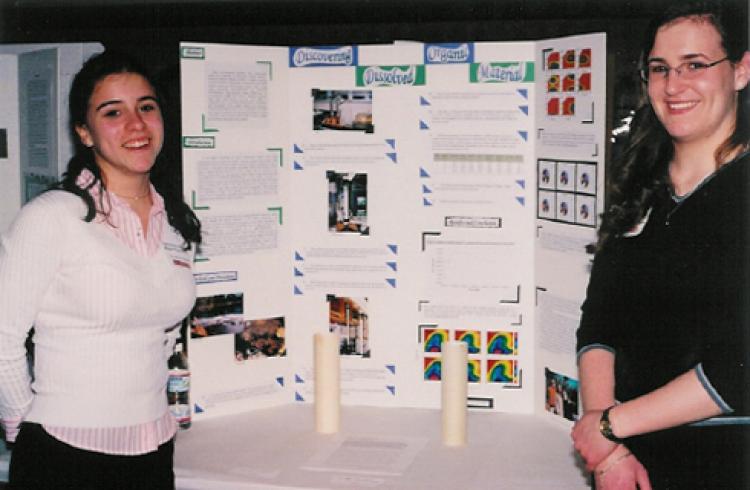
Theresa Denison (Centaurus High School), and Veronica Carrasco (Centaurus High School) pose with their science fair poster illustrating seasonal changes in the chemistry and redox state of dissolved organic matter, Nymph Lake, Rocky Mountain National Park. Their work was done under the mentorship of INSTAAR graduate student Rose Cory. Their project won several prizes in regional science fairs in spring 2004 including 1st place in the Earth and Space Science category at the Colorado-Wyoming Junior Academy of Science. They were invited to participate in the National Science Fair in Washington DC.
The Symposium is open to all CU-Boulder students (grad & undergrad) and faculty working in any aspect of hydrologic sciences, especially those doing interdisciplinary research (e.g. hydrogeology, hydroecology, aquatic biology, biogeochemistry, environmental and water resource engineering, etc.). We also invite hydroscience researchers in the Boulder area to submit an abstract (ie, USGS, NOAA, NCAR). Submitting a poster or talk that you have already presented at another conference is fine, as long as it does not violate an agreement you made with the other conference. Making a presentation of a collaborative study for which you are not first author is fine too, as long as you made a substantial contribution and are familiar with all aspects of the study.
2016
11th Annual Hydrologic Sciences Student Research Symposium
2016 Keynote Speakers
- Matthew Cohen, School of Forest Resources and Conservation, University of Florida, Gainesville, FL
- Amy East, U.S. Geological Survey, Pacific Coastal and Marine Science Center, Santa Cruz, CA
- Thomas Painter, Jet Propulsion Laboratory/California Institute of Technology, Pasadena, CA
- Robert Runkel, U.S. Geological Survey, Colorado Water Science Center, Denver, CO
Sponsors
Civil, Environmental & Architectural Engineering - Geography - Geological Sciences - Environmental Studies - Institute of Arctic and Alpine Research - CU Graduate School
Many Thanks to
The planning committee: Anna Bergstrom, Jordan Carroll, Keith Jennings, and Christa Torrens
Faculty Advisors: Michael Gooseff and John Pitlick
Poster Session - Thursday, March 31, 2016, 12:00 - 12:55
- Curtis Beutler: Insights on Snow Measurement Technique and Site Area Representation at Niwot Ridge from the 2016 Snow Hydrology Internship
- Eryan Dai: L-band Soil Moisture Mapping Using Small UnManned Aerial System
- Joshua Darling: Temperature Effects On The Growth Rates Of Diatoms From Streams In The McMurdo Dry Valleys, Antarctica
- Ursula Rick: Western Water Assessment: Innovative Research in Partnership with Decision Makers
- Sarah Evans: Effects of warming on groundwater flow in mountainous snowmelt-dominated catchments
- Harrison Gray: Modeling and observations of luminescence in river sediment from the US Mid-Atlantic Region: implications for obtaining sediment transport information
- Steven Henning: Dynamic response of watershed subsurface systems to extreme precipitation events - Implications for the 2013 Colorado Front Range Floods
- Alice Hill: Capturing hydrologic regime changes over regional scales: Lagrangian sampling and rapid hydro assessment methodologies
- Jenna Stewart: A physically based modeling framework for analyzing the effects of climate change and land-cover disturbance on suspended sediment transport in the Colorado Front Range
- Chris Williams: Data Analysis Methods for Measuring Impact of a Conservation-Focused Residential Irrigation Inspection Program
- Taylor Winchell: Early snowmelt decreases ablation period carbon uptake in a high elevation, subalpine forest, Niwot Ridge, Colorado, USA
2015
10th Annual Hydrologic Sciences Student Research Symposium
Water in Motion: The Role of an Irreplaceable Resource
2015 Keynote Speakers
- Andrew Fahlund, Deputy Director, California Water Foundation, Sacramento, CA
- Dr. James Famiglietti, Professor of Earth Systems Science, University of California, Irvine and Senior Water Scientist, NASA Jet Propulsion Laboratory
- Dr. Sally Thompson, Assistant Professor of Civil and Environmental Engineering, University of California, Berkeley
Sponsors and Donors
- Wilson Water Group
- Corona Environmental Consulting
Poster Session - Thursday, April 2nd, 2015, 12:00 - 12:55
- Sarah Evans: Characterization Of Groundwater Storage In The Heihe Headwater Watershed, Qinghai-Tibet Plateau, China
- Mehran Ghandehari: Density-Based Stream Network Extraction From Digital Elevation Models
- Alice Hill: Characterizing The Role And Controls Of Snowmelt In Alpine Groundwater Recharge
- Josh Jones: Examination Of Storm Cycles In A Rocky Mountain Subalpine Snowpack Using d18O Analysis And Seasonal Snow Pit Data
- Simon Mostafa: Photochemical Inactivation Of E. Faecalis In The Presence Of Organic Matter
- Mark Raleigh: Which Forcing Data Errors Matter Most When Modeling Seasonal Snowpack?
- Carleigh Samson: Modeling the Impact of Climate Change on TOC Threshold Exceedances for Meeting DBP Regulations
- Peter Shellito: Soil Hydraulic Properties Modeled From Meter To Kilometer Scales Based On In Situ And SMOS Soil Moisture Data
- Bill Szafranski: Simulation Of Daily Flow Data Using A Stochastic Nonparametric Model (K-Nearest Neighbor)
- Matthew Weingarten: High-Rate Injection Is Associated With The Increase In U.S. Mid-Continent Seismicity
- Alana Wilson: Age And Origin Of Waters: What Hydrogen And Oxygen Isotopes In A Glacierized Catchment Can Tell Us
- Qinghuan Zhang: Hydrologic Simulations In Two Subcatchments Of The Boulder Creek Watershed
Sponsors
Civil, Environmental & Architectural Engineering - Geography - Geological Sciences - Environmental Studies - Institute of Arctic and Alpine Research - CU Graduate School
Many Thanks To
The planning committee: Alice Hill, Kelsey Dailey, Taylor Winchell, Nora Catolico, Mandi Hohner, Caitlin Glover, Peter Shellito, and Kaelin Cawley
Faculty Advisors: John Pitlick and Diane McKnight
Student Prizes Donated by
Wilson Water Group
Corona Environmental Consulting
2014
9th Annual Hydrologic Sciences Student Research Symposium
Water: Our Global Solvent
April 3rd & 4th, 2014
University Memorial Center
University of Colorado Boulder
2014 Keynote Speakers
- Roger Bales, Professor, Sierra Nevada Research Institute, University of California Merced
- Bonnie Colby, Professor, Agricultural and Resource Economics, University of Arizona
- Stephen Osborn, Assistant Professor, Geological Sciences, California State Polytechnic University
Sponsors and Donors
- Boulder area consulting firm, AMEC Consulting, sponsors the student awards.
- CU departments, GEOG, GEOL, ENVS, and CEAE, contributed funds to cover the costs of the symposium.
- INSTAAR and the Graduate School provide financial support for the Hydrologic Sciences Program.
Poster Session - Thursday, April 3rd, 2014, 12:00 - 1:15p
- Henry Brandes: Evaluating the effects of precipitation and wind speed on snow water equivalence along an elevation gradient using 30 years of LTER snow-pit data
- Benjamin Castellani: Comparing the Annual Pattern of Snowfall and Accumulation at Summit, Greenland
- Clara Chew: Surface soil moisture estimations using GPS-Interferometric Reflectometry: error sources and sensing limits
- Steven Crisp: Quantifying long-term geomorphological change in Dry Valley streams: integrating survey data with subsequent LiDAR surveys
- Rachel Gabor: More than just the sum of the catchment: In-stream processing of water-soluble soil organic matter
- Amanda Hohner: Assessing wildfire impacted source water quality and treatability in the Cache la Poudre watershed through monitoring and a lab-based leaching study
- John Meyer: Characterizing fire impacted dissolved organic matter (DOM) before and after coagulation treatment
- Brett Poulin: Mercury transformation and release dynamics under saturation conditions in contaminated riparian soils
- Mark Raleigh: Spatial and interannual variability of snow interception in coniferous forest canopies
- Garrett Rue: Increasing ARD and rare earth metal concentrations in an alpine watershed
- Dominik Schneider: Combining remotely-sensed snow water equivalent with in-situ measurements to produce a real-time SWE product
- Brooke Stamper: Drier Soils in a Warming World? Examining the Relationship Between Soil-Water Stress and Snow Persistence in the Mountain West
Sponsors
Civil, Environmental & Architectural Engineering • Geography • Geological Sciences • Environmental Studies • Institute of Arctic and Alpine Research • CU Graduate School
Many Thanks to:
The planning committee: Jessica Dehart, Daniel Broman, Ben Livneh, Christopher Florian, Kaelin Cawley, Theodore Barnhart, Garrett Rue, and Elizabeth Koebele for organizing the symposium. Faculty Advisors: John Pitlick and Diane McKnight for advising.
Students Prizes Donated by:
AMEC Earth & Environmental is AMEC’s full-service engineering, environmental, and construction management division. AMEC’s Colorado offices have provided quality water resources management services throughout the state of Colorado since 1983. Our Colorado offices are staffed with civil/drainage/water resources engineers, water system and hydrologic modelers, geoscientists, environmental scientists, planners, and GIS and CAD specialists. These specialists form multi-disciplinary teams to unlock value for our clients. Our success is built upon maintaining the “best in industry staffâ€, providing technical innovation, and delivery of cost effective solutions.
2013
Keynote Speakers:
11am Monday
Dr. Dennis Lettenmaier: Professor, Civil and Environmental Engineering, University of Washington-Seattle
4pm Monday March 18th
Dr. Patty Limerick: Faculty Director and Chair of the Board, Center of the American West, Professor of History, University of Colorado-Boulder
2:30pm Tuesday March 19th
Dr. Patrick Belmont, Assisstant Professor, Watershed Sciences, Utah State University
Posters
- Daniel Broman: Climatic Variability of the West African Monsoon and its Influence on Meningococcal Meningitis Susceptibility
- Logan Callihan: Robust Decision Strategies for Climate Change Assessment
- Kelsey Cody: Climate Change, Growth, and Regional Integration: Lessons for Municipal and Industrial Water Providers
- Lianne Daugherty: Application of Stochastic Weather Generator based Seasonal Ensemble Streamflow Forecasts to Water Resources Management
- Brian Ebel: Wildfire and hillslope aspect impacts on subsurface hydrologic response
- Solomon Erkyihun: Modeling Large Scale Climate Indicators Using Wavelet-based Time Series Method
- Sarah Evans: Sensing Vegetation Growth and Senescence with Reflected GPS Signals
- Shahen Huda: Modeling the Effects of Bed Topography on Fluvial Erosion by Saltating Bed Load
- Roseanna Neupauer: An Adjoint Approach to Estimating Stream Depletion
- Nadine Reitman: 3D modeling of groundwater flow and solute transport in a watershed underlain by salt deposits in southeast Utah
- Dominik Schneider: A regression-based approach for blending remotely sensed and in-situ snow water equivalent estimates in the Colorado River Basin
- Robert Semborski: Small Scale Spatial Variations Within the Snowpack on Niwot Ridge Long Term Ecological Research Site
- Eli Townsend: Correlating the spectroscopic properties of organic matter to the photochemical formation of hydroxyl radical in natural waters
- Julia Traylor: Optimal Initial Configuration of Treatment Solution for In Situ Remediation with Engineered Injection and Extraction in Homogeneous and Heterogeneous Aquifers
- Yanto Yanto: Investigating ENSO Signal in Ciliwung Streamflow Variability, Jakarta, Indonesia
Sponsors
Civil, Environmental & Architectural Engineering • Geography • Geological Sciences • Environmental Studies • Institute of Arctic and Alpine Research • CU Graduate School
Many thanks to:
The planning committee: Sara Tabatabaie, Bill Szafranski, Ben Livneh, Katya Hafich, Kaelin Cawley, Rebecca Smith, Abby Kuranz, Rachel Gabor, Logan Callihan, Brian Buma, and Andy Wickert for organizing the symposium.
Faculty Advisors: John Pitlick, and Diane McKnight for advising.
Student Prizes Donated by:
AMEC Earth & Environmental is AMEC’s full-service engineering, environmental, and construction management division. AMEC’s Colorado offices have provided quality water resources management services throughout the state of Colorado since 1983. Our Colorado offices are staffed with civil/drainage/water resources engineers, water system and hydrologic modelers, geoscientists, environmental scientists, planners, and GIS and CAD specialists. These specialists form multi-disciplinary teams to unlock value for our clients. Our success is built upon maintaining the “best in industry staffâ€, providing technical innovation, and delivery of cost effective solutions.
2012
2012 Keynote Speakers
- Dr. Mary Hill , Senior Research Hydrologist at U.S. Geological Survey (USGS)
- Dr. Nandita Basu, Assistant Professor Civil and Environmental Engineering, University of Iowa
Dr. Emily H. Stanley, Professor of Zoology and Center for Limnology, University of Wisconsin
